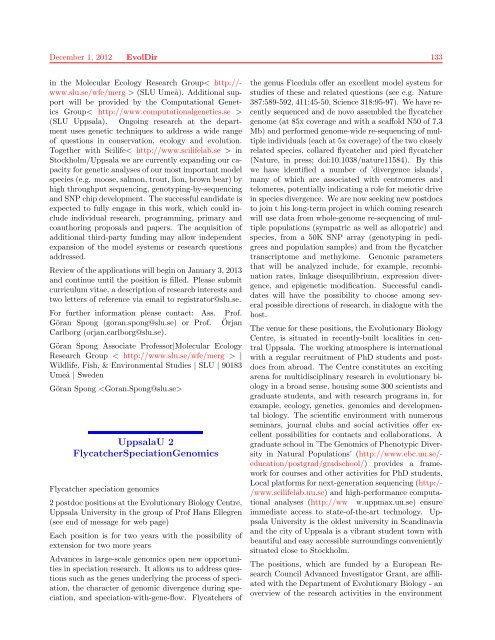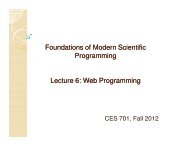E v o l D i r
E v o l D i r
E v o l D i r
Create successful ePaper yourself
Turn your PDF publications into a flip-book with our unique Google optimized e-Paper software.
December 1, 2012 EvolDir 133<br />
in the Molecular Ecology Research Group< http://www.slu.se/wfe/merg<br />
> (SLU Ume˚a). Additional support<br />
will be provided by the Computational Genetics<br />
Group< http://www.computationalgenetics.se ><br />
(SLU Uppsala). Ongoing research at the department<br />
uses genetic techniques to address a wide range<br />
of questions in conservation, ecology and evolution.<br />
Together with Scilife< http://www.scilifelab.se > in<br />
Stockholm/Uppsala we are currently expanding our capacity<br />
for genetic analyses of our most important model<br />
species (e.g. moose, salmon, trout, lion, brown bear) by<br />
high throughput sequencing, genotyping-by-sequencing<br />
and SNP chip development. The successful candidate is<br />
expected to fully engage in this work, which could include<br />
individual research, programming, primary and<br />
coauthoring proposals and papers. The acquisition of<br />
additional third-party funding may allow independent<br />
expansion of the model systems or research questions<br />
addressed.<br />
Review of the applications will begin on January 3, 2013<br />
and continue until the position is filled. Please submit<br />
curriculum vitae, a description of research interests and<br />
two letters of reference via email to registrator@slu.se.<br />
For further information please contact: Ass. Prof.<br />
Göran Spong (goran.spong@slu.se) or Prof. Örjan<br />
Carlborg (orjan.carlborg@slu.se).<br />
Göran Spong Associate Professor|Molecular Ecology<br />
Research Group < http://www.slu.se/wfe/merg > |<br />
Wildlife, Fish, & Environmental Studies | SLU | 90183<br />
Ume˚a | Sweden<br />
Göran Spong <br />
UppsalaU 2<br />
FlycatcherSpeciationGenomics<br />
Flycatcher speciation genomics<br />
2 postdoc positions at the Evolutionary Biology Centre,<br />
Uppsala University in the group of Prof Hans Ellegren<br />
(see end of message for web page)<br />
Each position is for two years with the possibility of<br />
extension for two more years<br />
Advances in large-scale genomics open new opportunities<br />
in speciation research. It allows us to address questions<br />
such as the genes underlying the process of speciation,<br />
the character of genomic divergence during speciation,<br />
and speciation-with-gene-flow. Flycatchers of<br />
the genus Ficedula offer an excellent model system for<br />
studies of these and related questions (see e.g. Nature<br />
387:589-592, 411:45-50, Science 318:95-97). We have recently<br />
sequenced and de novo assembled the flycatcher<br />
genome (at 85x coverage and with a scaffold N50 of 7.3<br />
Mb) and performed genome-wide re-sequencing of multiple<br />
individuals (each at 5x coverage) of the two closely<br />
related species, collared flycatcher and pied flycatcher<br />
(Nature, in press; doi:10.1038/nature11584). By this<br />
we have identified a number of ’divergence islands’,<br />
many of which are associated with centromeres and<br />
telomeres, potentially indicating a role for meiotic drive<br />
in species divergence. We are now seeking new postdocs<br />
to join t his long-term project in which coming research<br />
will use data from whole-genome re-sequencing of multiple<br />
populations (sympatric as well as allopatric) and<br />
species, from a 50K SNP array (genotyping in pedigrees<br />
and population samples) and from the flycatcher<br />
transcriptome and methylome. Genomic parameters<br />
that will be analyzed include, for example, recombination<br />
rates, linkage disequilibrium, expression divergence,<br />
and epigenetic modification. Successful candidates<br />
will have the possibility to choose among several<br />
possible directions of research, in dialogue with the<br />
host.<br />
The venue for these positions, the Evolutionary Biology<br />
Centre, is situated in recently-built localities in central<br />
Uppsala. The working atmosphere is international<br />
with a regular recruitment of PhD students and postdocs<br />
from abroad. The Centre constitutes an exciting<br />
arena for multidisciplinary research in evolutionary biology<br />
in a broad sense, housing some 300 scientists and<br />
graduate students, and with research programs in, for<br />
example, ecology, genetics, genomics and developmental<br />
biology. The scientific environment with numerous<br />
seminars, journal clubs and social activities offer excellent<br />
possibilities for contacts and collaborations. A<br />
graduate school in ’The Genomics of Phenotypic Diversity<br />
in Natural Populations’ (http://www.ebc.uu.se/education/postgrad/gradschool/)<br />
provides a framework<br />
for courses and other activities for PhD students.<br />
Local platforms for next-generation sequencing (http:/-<br />
/www.scilifelab.uu.se) and high-performance computational<br />
analyses (http://ww w.uppmax.uu.se) ensure<br />
immediate access to state-of-the-art technology. Uppsala<br />
University is the oldest university in Scandinavia<br />
and the city of Uppsala is a vibrant student town with<br />
beautiful and easy accessible surroundings conveniently<br />
situated close to Stockholm.<br />
The positions, which are funded by a European Research<br />
Council Advanced Investigator Grant, are affiliated<br />
with the Department of Evolutionary Biology - an<br />
overview of the research activities in the environment

















